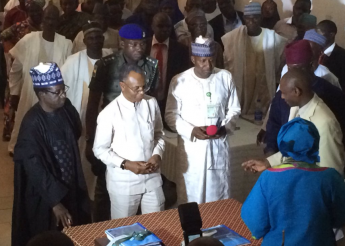Newsroom
News & Press Releases


High-Powered Sports Events Like the World Cup Usually Fail to Burnish a Country’s Image
15 Jul 2018H5 Strategies Senior International Vice President Tony Pisaroglu has published an editorial this morning with Romania’s leading daily newspaper and online platform, Adevarul, on why high-powered sports events such as the World Cup typically fail to burnish a country’s image in the long term. The most successful image campaigns, he asserts, are supported by a real action plan and reform agenda.
Interested readers can read the Romanian version at this link, and the English version below.
—
High-Powered Sports Events Like the World Cup Usually Fail to Burnish a Country’s Image
Tony Pisaroglu
When the World Cup ends in Russia, there will be lots of after-the-event analysis about what went right and wrong in the soccer championships that hundreds of millions watched around the world.
One issue is whether the $14 billion that Russia spent on the games — the second-largest amount ever — was a cost-effective way to counter the image problem the country is suffering in many parts of the world. The problems include Russia’s authoritarian system, its invasion of Crimea and support for the eastern Ukrainian rebels, its support for the brutal Assad regime in Syria, its meddling in U.S. and British elections, the growing inequality between rich and poor in Russia, and the country’s one-dimensional petroleum-based economy.
Russia is far from the only authoritarian government to try to use grandiose sports events to polish its image. It’s been happening for nearly a century.
The idea is to spotlight your country’s ability to put on a complex event such as a World Cup or Olympics to impress the world with your system of government and your leaders.
The most often cited example is Hitler’s use of the Munich Olympics of 1936 to try to show the world that he was a strong and capable leader and that Nazism was effective and should be emulated.
Ever since then, authoritarian governments have put on international sports events to try to burnish their image. One of their hopes is that the galas will distract the world from their country’s problems, including repression, human rights violations, poverty, inequality between rich and poor, racism, and others.
It has not worked before, and it likely never will, but governments desperate to improve their reputations keep trying it.
In an era awash with fake news, some would contend that a sports extravaganza designed to distract attention away from a country’s deep-seated problems, like poverty, is the ultimate in fake news.
One reason why most of these image-burnishing efforts do not work is that international journalists call the host countries out on them.
Even before they arrive from their homelands for the event, these journalists are writing pieces about the host country’s problems and the event’s massive costs.
Many of their stories say flat-out that a key reason the host country is holding the event is to try to take the international spotlight off its problems, starting with repression and poverty.
If the event is costly — and most of the big ones today are in the billions — international journalists raise the question of whether it is worth spending such huge sums at a time when the country faces widespread poverty and other problems.
Countries besides Russia that have spent a lot of money in recent years on international sports extravaganzas include China, Turkmenistan and Kazakhstan. Like Russia, they are doing so to raise their international profile.
With the world’s second-largest economy, a case can be made that China’s spending on billion-dollar sports events like the Summer and Winter Olympics does not have a sizable impact on the country’s efforts to reduce income inequality. While China’s rise to economic superstardom has lifted many of its citizens out of poverty, major income gaps remain between rural and city dwellers and between regions.
Because Turkmenistan and Kazakhstan’s economies are a fraction of China’s, however, billion-dollar sports events account for a much larger percentage of their national budgets. This means they must divert money from other programs to cover the sports events.
One thing that can give a championship-hosting country a publicity pop is if its sports team does well in the event it is holding.
Russia looked great at the Sochi Winter Olympics in 2016, which cost a staggering $50 billion — the most ever for any Olympics. Its team dominated the competition, winning dozens of medals.
The positive publicity blew up in Russia’s face when evidence surfaced that the government had encouraged its team to dope and helped it devise a way to hide the doping. When Olympics officials learned of the doping scam, the positive publicity that Russia had received from dominating the competition morphed into a PR nightmare.
Russia got a similar publicity pop when its team went further than expected in this summer’s World Cup.
But positive publicity built on the shifting sand of trying to distract the world from a country’s domestic and foreign-policy blemishes can be fleeting.
In Russia’s case, it was a pro-Ukraine comment that a Croatian player made after his team upset Russia in the World Cup.
Because of the provocative foreign-policy implications of the comment, it received global news coverage, causing Russian officials to grit their teeth.
To be fair, the international press and public have generally agreed that Russia has run a smooth World Cup.
But the answer to the question of whether the $14 billion that it spent on the championships has helped it burnish its international image in the right quarters is no.
The same countries that have blasted Russia for its adventurism in Ukraine and Syria, for its attempts to influence the 2016 U.S. presidential election and the Brexit vote, and for using chemical weapons against Russian nationals on other countries’ soil won’t change their views because of an efficiently run Russian World Cup.
In the case of image polishing, a good old-fashioned public relations campaign would do a much better job for a country than hosting an international sports extravaganza — and at a fraction of the cost.
Tony Pisaroglu is senior international vice president at H5 Strategies.






